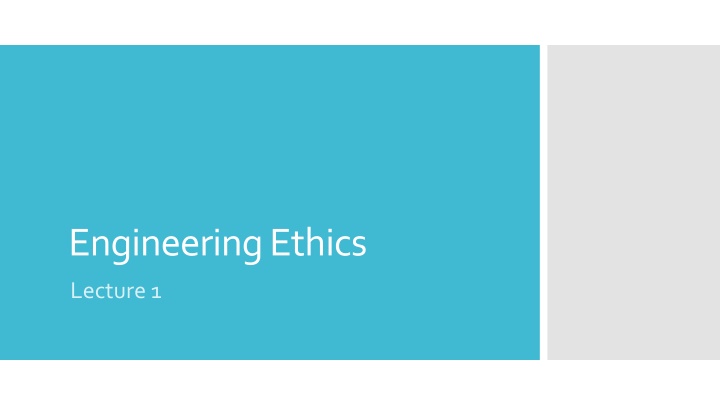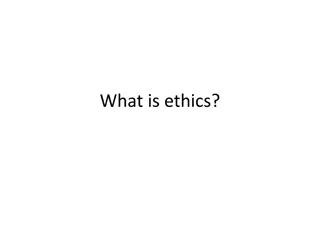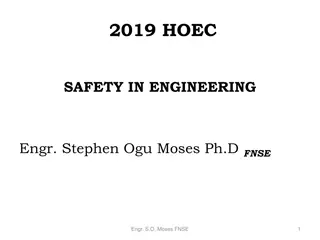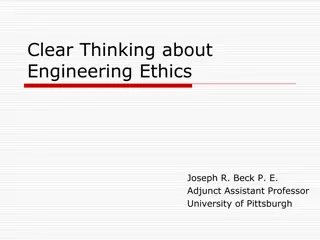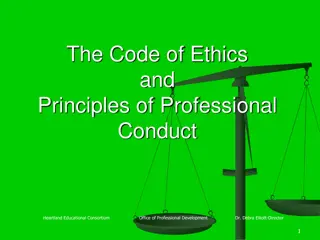Engineering Ethics: Principles of Conduct and Consequences
Engineers play a critical role in society by designing products and processes that impact people's lives. This lecture explores the ethical aspects of engineering, focusing on moral values, decision-making, and the consequences of engineering practices. It highlights the importance of considering ethics in engineering courses and in the profession as a whole.
Download Presentation

Please find below an Image/Link to download the presentation.
The content on the website is provided AS IS for your information and personal use only. It may not be sold, licensed, or shared on other websites without obtaining consent from the author.If you encounter any issues during the download, it is possible that the publisher has removed the file from their server.
You are allowed to download the files provided on this website for personal or commercial use, subject to the condition that they are used lawfully. All files are the property of their respective owners.
The content on the website is provided AS IS for your information and personal use only. It may not be sold, licensed, or shared on other websites without obtaining consent from the author.
E N D
Presentation Transcript
Engineering Ethics Lecture 1
System of moral principles Principles of right and wrong Principles of conduct governing behavior of an individual or a group The group can be: Nation, or geographical area, group of nations, religious or life view groups, profession or similar, or other organisation (e.g. sports, clan,..) What is Meant by Ethics?
A persons behavior is always ethical when one: 1. Does what is best for oneself 2. Has good intentions, no matter how things turn out Question 3. Does what is best for everyone 4. Does what is legal
We have been studying engineering, such as design, analysis, and performance measurement. Ethics in an Engineering Course???? Where does ethics fit in?
Engineers . . . Build products such as cell phones, home appliances, heart valves, bridges, & cars. In general they advance society by building new technology. How Ethics Fits into Engineering ? Develop processes, such as the process to convert salt water into fresh water or the process to recycle bottles. These processes change how we live and what we can accomplish.
If the bridge has an inadequate support, it will fail. If the gas tank is positioned too close to the bumper, it might explode from a small accident. If a medical instrument isn t accurate, improper doses of medication can be given. If the process for refining gas produces too much toxins, it harms the local community. Products and processes have consequences for society
The study of the moral values, issues, and decisions involved in engineering practice. Decisions made by engineers usually have serious consequences to people. Ethics and ethical reasoning guide decision-making. Engineering Ethics
The Essence of Your Engineering Career Engineering is one of the most important professions in society. As engineers we build things and make processes in order to better society.
One main connection between ethics and engineering comes from the impact that engineered products and processes reflect on society. Engineers have to think about designing, building, and marketing products that benefit society. Social Responsibility requires taking into consideration the needs of society. Social Responsibility
Ethics has a second connection with engineering. It comes from the way in which being socially responsible puts duties and obligations on us individually. Ethics fits into engineering is through professional responsibility. Professional Responsibility
Ethics is part of engineering for two main reasons. Two Dimensions of Ethics in Engineering a) Engineers need to be socially responsible when building products and processes for society. b) Social responsibility requires professional responsibility.
Safety Acceptable risk Compliance Confidentiality Environmental health Data integrity Conflict of interest Honesty/Dishonesty Societal impact Fairness Accounting for uncertainty, etc. Typical Ethical Issues that Engineers Encounter
Primarily, a code of ethics provides a framework for ethical judgment for a professional. The key word here is framework. No code can be totally comprehensive and cover all possible ethical situations that a professional engineer is likely to encounter. Codes serve as a starting point for ethical decision making. Code of ethics
A code can also express the ethical conduct shared by members of a profession. It is important to note that ethical codes do not establish new ethical principles. They simply reiterate principles and standards that are already accepted as responsible engineering practice. Code of Ethics (cont.)
The way ethical issues can apply to ones life are based onrole responsibilities. Role responsibilities are responsibilities that attach to us based on a role that we have. Each of us has different roles that we play in our life. Engineering Student Friend Citizen parent Employee Role- Responsibilities
Role Responsibilities Friend Look out for the interests of your friend. Role- Responsibilities (cont.) Athlete Play your sport in a professional manner. Employee Perform the duties of your job. Parent Look after your children and their interests Citizen Follow the laws of the country in which you live.
It is not a legally binding document. It is not something that we want (or need) engineers to memorize. It is something we want engineers to understand and be able to live by as engineers. However, in the beginning knowing the code is a guide to understanding how to apply it. Important Notes about the Code of Ethics
Unlike robots, no one can just program you to be an ethical engineer that follows the codes. It is possible to know the codes of ethics for engineering (or being a student), yet fail to follow them. Ethical behavior is about practice. It is about going beyond the codes, and practicing behavior that leads to an ethical life. Ethics Takes Practice Knowledge vs. Behavior
Which of the following ensure that behavior is ethical? I. Following the law II. Acting in the best interest of society III. Following non-legal standards for socially appropriate conduct question A. All of the above II and III only B. None of the above C. D. I only
Legal & Moral Illegal & Moral Legal & Immoral Illegal & Immoral Law vs. Morality: Don t Confuse the Two
Legal & Moral Designing a system to be safe. Legal & Immoral Owning a slave pre-civil war in the US. Examples of the Categories Illegal & Moral Parking in a no parking zone, to come to the aid of an injured person Illegal & Immoral Killing aninnocent person.
